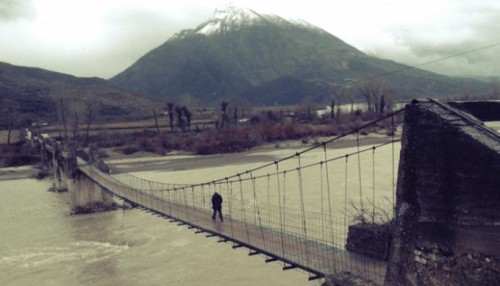A report by Ben Andoni/ JAVA Magazine
For those who don’t know: The so-called wild rivers that still remain on our continent flow through the Balkans. But the habitats of animals and exceptional plants in them are today being threatened by the construction of dams. In particular, “Vjosa” has aroused an international interest to protect it in the conditions in which it is located. An international movement, represented by Riverwatch and Euronatur in cooperation with EcoAlbania in Albania, have launched the “Save the Blue Heart of Europe” campaign for this purpose. How much will he achieve? The challenge has started, and the “Friends of Vjosa” are being added with the sole purpose of having it… declared a National Park.

It’s been a few days since Vjosa, together with her sisters in the South of Albania, have been sent to prison. From a van agreed by “EcoAlbania” (almost a week ago), we follow the meandering and in some places its wild invasion. Between Novosela, the water lies calmly in the fields, while beyond the river still flows thunderously. Three hours later, in bullet time, we arrive in Tepelena. Vjosa has somewhat calmed down, but the many residents who have gathered to talk on the occasion of a familiarization tour that EcoAlbania is making, feel frustrated. They speak. They approach little by little a hall in the center of the barren city. In the tradition of the area, they don’t let the romuzets follow anyone. They court their friends. The dark and very boring hall adds to the drama of the meeting. Patheticism rules… Residents speak under their breath, but it seems that a part, very little, is impressed by “EcoAlbania” and its partners, the Civil Society, who have taken over the protection of rivers like Vjosa, with great natural potential from uncontrolled development of hydropower projects. Disbelief and annoyance quickly spread. The representatives of “Eco Albania”, arrived a day ago, orient them to the next meeting, where Prof. Aleko Miho, Dr. Vera Bekteshi and the well-known German river activist Ulrich Eichelmann, confess in a scientific-citizen discourse the importance of establishing a National Park along the Albanian valley of Vjosa. Germany, representative of the “Riverwatch” organization, at the end of the year, did the same, speaking directly to the residents of Përmet, detailing the importance of this rare natural wealth. As is usually the case with Albanians, they initially did not take the meeting seriously, but the researchers did not want to know. Bekteshi gives a summary speech, politely letting Eichelmann speak. The 52-year-old speaks briefly and, thanks to power point, clearly expresses his ideas. There are almost 600 dams that will be built from Slovenia to Albania.
Nobody cares. We would like you not to make our mistakes, because the Europeans also help those who build dams, he tells the citizens. “Vjosa is one of the only remaining wild rivers in Europe and as such it must be protected”, he emphasizes. He is a slightly crazy idealist in the Albanian version. He presented the appeal in an interesting article of “Der Spigel”, in the English version, while “Geo Magazine”, after that, marveled at Vjosa, attributing two pages to him. The locals are silent. Some women talk and kiss each other. However, the researchers continue: “If Albania will join the EU, one of the perspectives will be: ‘what can it offer us’ and this will not be industry, but nature. Let’s call it an increase of the values of the EU”, the man is heard. Prof. Miho calms everyone down, when he tells them briefly: “We kill Vjosa if it continues like this and luckily we have the opportunity to protect it precisely with EU legislation, by not building the hydropower dams”. With little speech we must stop the 8 dams that are planned to be built, he explains. “The best certification of this type of region is the national park”, concludes the German, who with his body language and athletic appearance shows that the challenge has begun and that the people of Vjosa already have the ball.
You can read the full report, published in JAVA magazine, here







